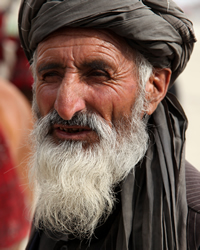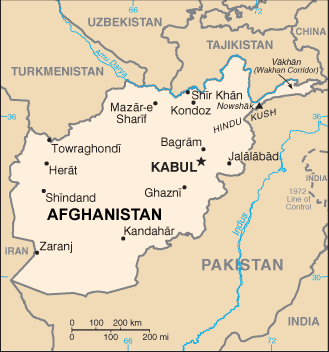The Pashtun of Afghanistan and Pakistan have been called the largest Muslim tribal society in the world. There are at least 30 major tribes, and countless sub-tribes and clans. Spread over a vast geographical area and riven by socio-economic, political, tribal and linguistic (dialectical) differences, Pashtuns nevertheless share a unique sense of common identity. Pashtun identity is based on four elements: Heritage (descent from a common ancestor); Islam (99.9% Muslim); the Pashtunwali Code of Honor ("The Way of the Pashtun"); and to some extent, language (Pakhtu or Pashto). They have dialectic differences, one of which is Southeast Pakhtu, who only live in Afghanistan.
There have been efforts to reach the Pashtun since 1818, when William Carey translated parts of the Old Testament into Pakhto, based on interaction with Pashtun traders who caravanned (and settled) across north India and beyond. (In South Asia, the name "Pashtun/Pakhtun" was anglicized to "Pathan"—a name immortalized in Rudyard Kipling's novels and British colonial history; today, the Pashtun in India, Bangladesh, and throughout South Asia are known as "Pathan".)
The first intentional mission to the Pashtun was launched by the Church Missionary Society in Peshawar, Pakistan (then Northwest India) in 1853. This was followed by over 150 years of faithful witness, through mission hospitals, schools, colleges, literature, friendship evangelism, and other forms of witness by national Pakistani (Punjabi) Christians and expatriate missionaries. Despite this record, and the slow but growing number of scattered Pashtun believers, a vibrant, indigenous, disciple making movement has yet to take root and spread.
Though most Pashtuns live in Pakistan, the Southeast Pashtun only live in Afghanistan.
More significant than dialectical differences, a Pashtun's primary loyalty is to his particular social group (tribe or sub-tribe). Even with the Pashtun-dominated Taliban regime running the Afghan government, the Southeast Pashtun give their primary loyalty to their own tribe. They will join with other Pashtun groups when it protects their interests but fight against the same groups to protect their own. Pashtuns look to their jingas, the assembly of leaders, as judges when there is a dispute. Note that this implies conflict resolution at the local level.
All Pashtun groups, including those who speak the Southeastern Pashtun, are Sunni Muslim. They believe the Five Pillars of Islam, and the basic creeds of Islam. Faith in Allah is one of the central beliefs of all Pashtun people. In some situations, they will unite under an Islamic leader.
Even more important than their Islamic beliefs is the Pashtunwali Code of Honor, AKA, "The Way of the Pashtun." These include the following Pashtun virtues. Hospitality is essential in this harsh land. It can be a matter of life and death, and peoples throughout Central Asia eagerly practice it. Closely related to that is asylum, which is more unique to the Pashtuns. A Pashtun is honor-bound to protect someone seeking asylum, even at great personal cost. At times this involves giving asylum to someone running from the law or offering help to one's own enemy. In this strife-ridden land, Pashtuns value justice and revenge. To them, revenge is a form of justice. One might wait decades to take revenge on someone who wronged them or brought them shame. Bravery and loyalty are among the highest virtues to all Pashtun communities. One must be brave and willing to lay down their life for their honor and for their community. A Pashtun shows honor by defending the weak around them, especially women.
Southeast Pashtun peoples have tremendous potential. If they allowed the Holy Spirit to transform their families and communities, they and those around them would be blessed beyond measure.
Pray for the production and distribution of all forms of media in their language, including literature, videos, music, movies, radio, websites, and social media. The demand and response have increased!
Scripture. Pray for Bible translations in progress to be accurate, and eventually given out freely.
Laborers. Pray for more workers to serve among the Southeastern Pashtun people—in education, business, healthcare, development, and other professional areas.
Believers. No one knows how many Pashtuns are following Jesus. Seeds of the gospel have been sown widely. The greatest barriers to faith are social and cultural.
Pray for God's Spirit to strengthen and protect new believers and to empower their lives and witness so that Christ will be given honor.
Scripture Prayers for the Pashtun, Southeast in Afghanistan.
| Profile Source: Joshua Project |











